Weight making is a unique part of sports that have weight categories or a limit.
With increasing levels of sports nutrition knowledge and professional support for Ireland's elite. Are men in weight classification sports able to lose it without ‘losing it’?
We need your consent to load this rte-player contentWe use rte-player to manage extra content that can set cookies on your device and collect data about your activity. Please review their details and accept them to load the content.Manage Preferences
Two-time Olympic bronze medallist Paddy Barnes believes that with better nutrition management, bronze could have been gold.
"Even though I have two bronze medals in the Olympics, sport is such fine margins,
"I reckon I could have been a gold medallist if I had more focus on the nutrition side of my career."
The Belfast boxer admits that he won fights when feeling the effects of extreme two-week weight loss protocols.
"I have felt so bad in fights where I have won.
"I would have starved for two weeks and dehydrated for a week to make weight and then had to compete at a high level.
"I was able to do it, but it was at the detriment of my own health," reflects Barnes of his determined approach.
The 37-year-old was diagnosed with Osteopenia in 2017 at just 30.
"It is basically, say one is normal bone health and zero is osteoporosis, well I'm between those, osteoporosis isn’t reversible, but osteopenia is,
"I was taking calcium, but I’m not boxing so I don’t really care anymore."
Osteopenia is typically diagnosed in people over 50, not an athlete in their 30s.
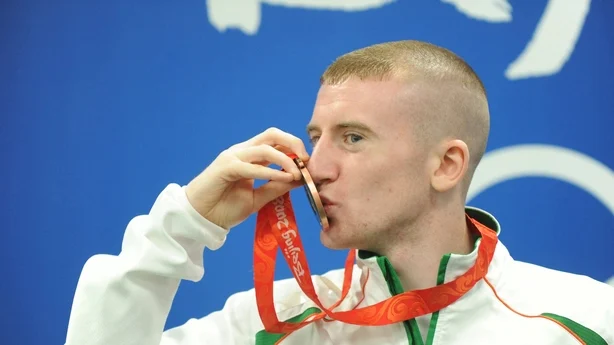
Boxing is a sport that tradtionally attracts athletes from working class backgrounds. This may create barriers to accessing adequate nutrition support at critical points in performance development.
When Barnes did receive nutrition support, particularly at the start of his career, he says it was inadequate.
"I have never had a proper education around food, eating habits, nutrition," he lists. "Sometimes you have talks, your governing body would arrange talks with a nutritionist but it’s all quite generic,
"Nothing tailored to you as an individual and your needs."
The Holy Family athlete feels that boxers like him needed more help in managing their weight making protocols.
"Sports science is a technical subject its tough, it's not black and white, there is a science to it… everyone’s body is different."
It is not just Barnes’s bones that have taken a hit, he believes his height has been affected by years of poor management of nutrition and extreme weight cutting protocols.
"I would have been six-foot if it hadn’t been for boxing," jokes Barnes, he adds, "I’m the smallest in my family, I’m only 5-foot-four-inches."
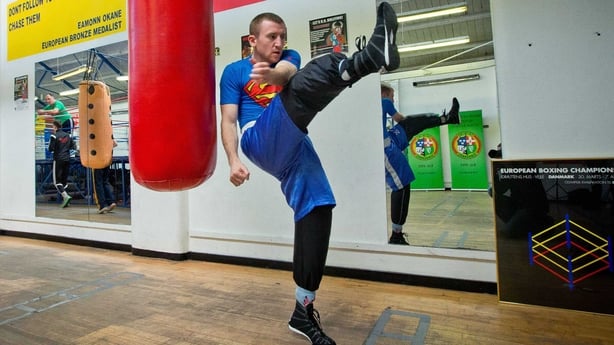
Another unwanted result of restricting food intake for Barnes has been changes to his appetitie.
The Belfast man has been retired for nearly five years and explains that now, he never feels hungry.
"I’m very rarely hungry but I eat just for the sake of eating as knowing that I can and I’m not training for a fight and making weight,
"If I see food, I will eat absolutely anything and everything, it’s not to fill me up it’s just to taste the food in my mouth."
Sport Ireland’s head of performance nutrition Dr. Sharon Madigan describes the side effects of long-term low energy availability (LEA) in men which reflects Barnes’s experience post-retirement.
"Metabolic health in terms of thyroid function, which then can lead to longer term issues with weight gain, maybe in the future.
"You've obviously got that piece around anxiety and issues around food,
"Binge purge type behaviours that start off in terms of making weight, but actually then continue on in terms of lifestyle… you've got bone health issues down the line as well."
Madigan explains that identifying LEA in men can be more difficult than in women, as the menstrual cycle acts as a 'clear cut' guide.
With athletes so focused on their sport and success, making them realise the impact of their behaviour on their long-term health is a challenge and Madigan knows that athletes may have no interest in that.
"I think you have to pick your moments," she says.
Double Olympic champion in lightweight rowing, Fintan McCarthy will be making a go of competing without any restrictions to his weight, now that lightweights are no longer part of the Olympic programme.
Despite taking a measured approach to making the mandatory 70kg average for the boat, McCarthy feels it still may have had an impact on his potential so far.
McCarthy's approach to making weight has been honed over his career and believes that it is a mistake to stay close to 'racing weight' all year.
"I think where a lot of lightweight athletes have gone wrong in the past, is that they stay around race weight for the entire season," reflects McCarthy. He adds "which obviously isn't great in terms of being able to fuel for training and for just life in general."
The world and Olympic champion seems to have a pragmatic attitude to the 'extreme' process and no longer stresses about making it.
"You always learn that it'll happen because you can't race without making weight."
McCarthy has processed that making the weight limit is what allows him to achieve his goals.
"I guess, the scale is what allows us to race because that's our category.
"It's not to do with performance or how you feel, it doesn't correlate to success. It just correlates to your ability to get on the start line."
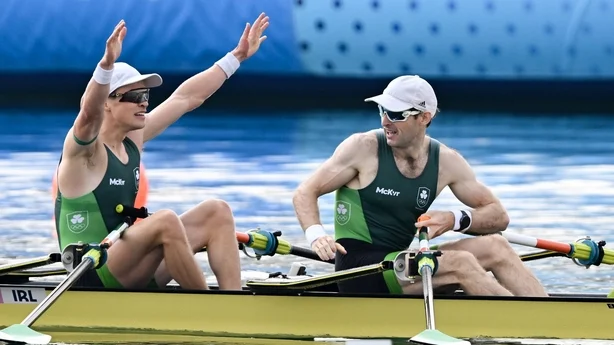
The Cork athletes does admit that over time he has pushed the limits more.
"As the years have gone on, you kind of push the limit more and more in terms of how much you can get down in the last few weeks."
It seems that for McCarthy the benefits of being fuelled for training outweighs the risks of using heat and fluid restriction for a short time.
"You want fuel and you want that bit of body mass for training anyway. Just to stay healthy and actually reap the benefits of training," explains McCarthy.
He does admit to feeling some ill effects, but having a partner in the boat is a motivator which differs to individual combat sports.
"I still get 'hangry'... But I'm not beating myself up over it...I kind of start getting a bit irritable.
"It's probably a lot easier to do it when you have someone else's regatta on the line. And it's not just about you, you're doing it for someone else."
"It's probably a lot easier to do it when you have someone else's regatta on the line. And it's not just about you, you're doing it for someone else." - Fintan McCarthy
Rowing mandates a two-hour window between weigh-in and competition to prevent extreme weight cutting and taekwondo introduced its own policy several years ago.
Ireland’s first Olympian in Taekwondo, Jack Woolley explains that randomised weigh-ins for a selection of the athletes on the morning of competitions has been introduced, in addition to 24-hours before the event.
Woolley suggests that this doesn't suit all fighters.
"For me it's a good thing, because it stops people cutting ten-kilograms which is what you would have seen before.
"I feel like the random weight in has kind of made me pace the day out a little bit more,
"It's giving me some sort of structure personally," he added.
The random weigh-in protocol has also been introduced to juvenile ranks. Which Woolley believes is a necessary measure to prevent weight reduction regimes for children.
Something that Woolley himself could have benefited from, as he explains, he began 'cutting’ for competitions from the age of eight.
"So, there was me, eight years of age on a diet.
"I wasn't dehydrating or anything, but I was watching what I was eating. And that was kind of the start of all this madness and turning into a bit of a diva." - Jack Woolley
"So, there was me, eight years of age on a diet.
"I wasn't dehydrating or anything, but I was watching what I was eating. And that was kind of the start of all this madness and turning into a bit of a diva.
"I was very 'hangry' all the time. That's just how I would explain my life. But I'd say it started becoming a regular thing, cutting weight, when I was about 14," detailed Woolley.
The two-time Olympian feels he began having deeper issues with food and his body image when he started secondary school.
"Your parents don't really see what you're eating.
"It got to the stage where it just wasn't because I wanted to be fighting a certain way.
"I used to bring my scales to school and weigh myself in between class because I was hoping I would lose 100 grams and be able to have a sip of water."
The challenge of making weight can cause athletes to use extreme methods, which Woolley admits he became a victim of.
"I Ignored all the advice… and just heard 'laxatives make you skinny’.
"Googled how I could buy one of them and ended up addicted to them from 2015 until 2020."
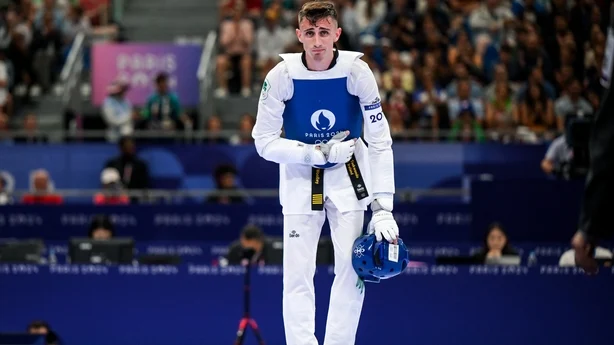
Participating in weight-related sports has been shown in research to be linked with higher use of problematic weight-control behaviour, like laxatives, dehydration and sauna use.
Woolley explains that he knew it was bad for him but stopping was difficult when he was competing regularly and there are no rules against it in his sport.
"I used covid to stop because we didn't have competitions,
"It was getting to the stage where I was bleeding, or I couldn't eat anything because it was making me feel sick and faint.
"It was all clear with anti-doping as well, so I had no excuse to stop."
Woolley is no longer using laxatives thanks to help from his sports psychologist at Sport Ireland.
"It's not worth it. You know… I'd rather fail weight than ever have to go back there.
"It was just very, very scary and I didn't know who to reach out to," explained Woolley.
It can be hard for athletes in weight category sports to get dietitians and nutritionists on board but the reality is that dehydration and sauna use are considered a normal part of competition preparation.
"Because it’s so drastic they don’t advise it.
"It's very difficult for me, not many people understand. They don't know how to deal with a taekwondo athlete.
"They don’t like the whole idea of dehydration. But realistically I won’t make the weight unless I dehydrate, and they are quite anti that." - Jack Woolley
Sports nutritionist Madigan agrees that working with such athletes can be conflicting, given the body of evidence showing the dangers of fluid and extreme calorie restriction.
"You're balancing out... Is it better with your help, or is it better without your help?"
The head of performance nutrition admits that seeing athletes ‘cutting weight’ using extreme methods is not something she relishes as a practitioner, as it goes against fundamental principles.
"This is not really somewhere that I enjoy being."
Madigan explains that last minute scheduling of competition can have an impact on the nutritionist’s ability to ensure the process is safe and athletes will resort to measures that she doesn't deem safe.
"When they're not seeing any movement on the scales. And as the weeks get closer and closer, the panic starts."
"So they go to their go-to place. Which is the sauna and fluid restriction. I put my head in my hands and go, 'I can't believe we're in this scenario again.'" - Dr. Sharon Madigan
"So they go to their go-to place. Which is the sauna and fluid restriction. I put my head in my hands and go, 'I can't believe we're in this scenario again.
Woolley has relocated to Madrid to continue his career under a new programme and is working with a nutritionist there in addition to the support he receives from Sport Ireland.
A change in weight category to the under 63kg class for some competitions will give Woolley more scope to focus on his performance and use less drastic cutting methods.
"I can actually focus on training and competition rather than being eaten alive by the fact I have to make weight, and then competition and training becomes like the second thought, and it shouldn't be like that."
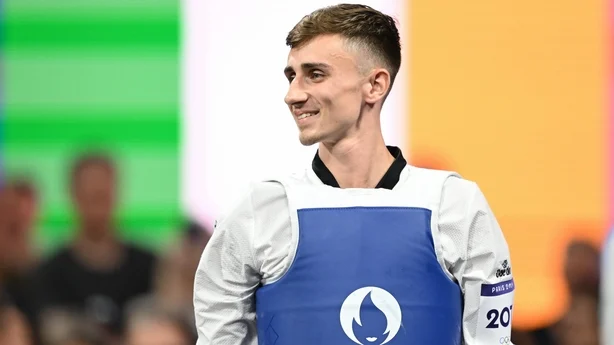
It’s viewed that it's not always possible for athletes to move up to a category that may be safer for them from a health perspective.
Madigan explains that moving up a class is more complex than just changing the weight you compete at. Height, reach and muscle mass are all considerations in boxing for example.
Madigan believes there is no easy solution, but that a combination of education for both athletes and coaches and policy change for sports could ease the use of weight loss methods that have a negative impact on long-term health.
Several international governing bodies have introduced body composition and scale policy.
Sport Ireland are following suit and are in the process of launching a campaign for athletes to take emphasis away from the scales for athletes.
While campaigns on this topic are positive, it’s hard to see how this message will resonate with those competing in weight category sport or who are male and it's not intended to serve.
As Woolley puts it,
"The weight is such a big part of our sport."
There is a lack of resources aimed at males or with a gender neutral stance.
In January 2022 an internal report on Swim Australia called for the banning of skinfold tests in girls and women.
In June 2023 Swim England announced the ban on weighing swimmers under-18 in club settings, quoting tackling disordered eating, anxiety and depression as the motivating factors behind the policy.
The emphasis of these policies is on females and the relevance to weight category sports is minimal.
It is assumed that feeling negatively about your body or experiencing side effects from weight loss or dieting in sport is an exclusively female phenomenon.
Too often men are exlcuded from the conversation, which adds further risk to an already dangerous and necessary part of weight category sport.
Details of organisations that may assist in relation to health issues can be found at rte.ie/helplines.
Disclaimer: The copyright of this article belongs to the original author. Reposting this article is solely for the purpose of information dissemination and does not constitute any investment advice. If there is any infringement, please contact us immediately. We will make corrections or deletions as necessary. Thank you.






